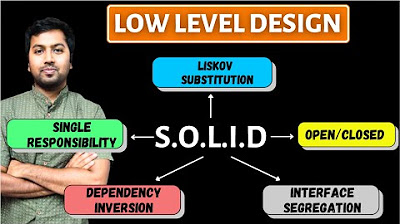SOLID (O básico para você programar melhor) // Dicionário do Programador
Summary
TLDRIn this video, the hosts delve into the SOLID principles of object-oriented programming, offering an engaging explanation of how these five key principles help developers write cleaner, more maintainable, and flexible code. They cover topics like the Single Responsibility Principle (SRP), Open-Closed Principle (OCP), Liskov Substitution Principle (LSP), Interface Segregation Principle (ISP), and Dependency Inversion Principle (DIP), illustrating each concept with practical examples. By applying these principles, developers can create code that's more modular, easier to test, and ready for future updates, ultimately making the development process more efficient.
Takeaways
- 😀 SOLID principles simplify object-oriented programming and make software easier to maintain and evolve.
- 😀 The Single Responsibility Principle (SRP) states that a class should have one reason to change, focusing on a single responsibility.
- 😀 Violating SRP leads to problems like lack of cohesion, high coupling, and difficulty in testing and reusing code.
- 😀 The Open-Closed Principle (OCP) emphasizes that classes should be open for extension but closed for modification, making it easier to add new features without altering existing code.
- 😀 The Liskov Substitution Principle (LSP) requires that subclasses should be replaceable with their base class without affecting the program’s correctness.
- 😀 Interface Segregation Principle (ISP) advises that classes should not be forced to implement interfaces they don’t need, promoting smaller, more specific interfaces.
- 😀 The Dependency Inversion Principle (DIP) advocates for depending on abstractions rather than concrete implementations to reduce high coupling between modules.
- 😀 SRP is considered the most important SOLID principle, as it addresses both coupling and cohesion in code.
- 😀 By following the OCP, developers can extend software functionalities without the risk of introducing bugs in existing features.
- 😀 Applying SOLID principles, along with clean code practices, helps developers write developers write more scalable, robust, and flexible software.
Q & A
What is SOLID in object-oriented programming?
-SOLID is an acronym for five principles in object-oriented programming that aim to make code easier to maintain, evolve, and extend. The principles are: Single Responsibility Principle (SRP), Open/Closed Principle (OCP), Liskov Substitution Principle (LSP), Interface Segregation Principle (ISP), and Dependency Inversion Principle (DIP).
Why is the Single Responsibility Principle (SRP) important?
-The SRP is important because it ensures that a class has only one reason to change, meaning it should only have one responsibility. This reduces complexity, prevents code from becoming a 'God Class', and makes the system easier to maintain and refactor.
Can the Single Responsibility Principle be applied only to classes?
-No, the SRP can also be applied to methods and functions. Any function or method should be responsible for only one task, which helps keep the code organized and easier to maintain.
What does the Open/Closed Principle (OCP) state?
-The OCP states that software entities (classes, modules, functions, etc.) should be open for extension but closed for modification. This means you should be able to add new functionality without changing existing code, helping to prevent bugs and reducing the risk of breaking existing features.
How can the Open/Closed Principle be applied in practice?
-To apply the OCP in practice, behavior should be separated behind interfaces, and dependencies should be inverted. For example, instead of modifying an existing class when a new behavior is needed, you create a new class that extends the existing code via an interface.
What does the Liskov Substitution Principle (LSP) ensure?
-The Liskov Substitution Principle ensures that objects of a derived class can be substituted for objects of the base class without affecting the correctness of the program. This means that derived classes should be able to inherit and extend functionality from the base class without breaking the behavior of the program.
What happens if the Liskov Substitution Principle is violated?
-If the LSP is violated, substituting a derived class for its base class could lead to unexpected behavior, errors, or exceptions. It's important that derived classes properly extend the base class functionality without introducing side effects or incompatibilities.
What is the Interface Segregation Principle (ISP) about?
-The ISP states that classes should not be forced to implement interfaces they do not use. Instead of one large, generic interface, it's better to create smaller, more specific interfaces, so classes are only responsible for the methods they actually need.
Why is the Dependency Inversion Principle (DIP) significant?
-The DIP is significant because it helps reduce tight coupling in your code. It suggests that high-level modules should not depend on low-level modules but both should depend on abstractions. This makes the system more flexible, easier to maintain, and less prone to breakage when changes occur.
How does the Dependency Inversion Principle relate to dependency injection?
-The DIP and dependency injection are related because both aim to reduce coupling between classes. While the DIP focuses on depending on abstractions rather than concrete implementations, dependency injection is a technique to provide those abstractions to classes, usually through constructor or method injection.
Outlines

This section is available to paid users only. Please upgrade to access this part.
Upgrade NowMindmap

This section is available to paid users only. Please upgrade to access this part.
Upgrade NowKeywords

This section is available to paid users only. Please upgrade to access this part.
Upgrade NowHighlights

This section is available to paid users only. Please upgrade to access this part.
Upgrade NowTranscripts

This section is available to paid users only. Please upgrade to access this part.
Upgrade NowBrowse More Related Video

Follow These 5 Functional Programming Rules For Better Code

Learn SOLID Principles with CLEAN CODE Examples

Single Responsibility Principle

1. SOLID Principles with Easy Examples | OOPs SOLID Principles Interview Question - Low Level Design

The Right way to write Nest.js & Typescript clean-code - SOLID

Principios SOLID en React.js (Buenas prácticas) con ejemplos prácticos
5.0 / 5 (0 votes)